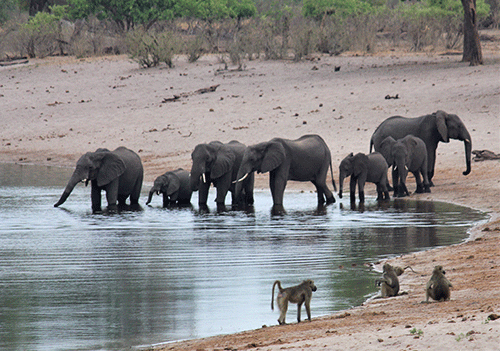Namibia has once again raised its voice by telling critics of trophy hunting to listen to those who have a track record in conservation, and that countries banning hunting and the import of trophies would not help conservation.
Environment minister Pohamba Shifeta recently told world leaders in Brussels, Belgium, “We need the African voice to be heard loud and clear.”
“Burning stockpiles of trophies will not help conservation. Even the trend for airlines to ban transporting trophies will not help conservation. Such measures will merely prove to be detrimental to conservation and the livelihoods of rural communities, as they will take away a critical source of income to communities, and may even turn communities against conservation,” Shifeta voiced.
He is hopeful that countries intending to institute any prohibitions and restrictions on the import of trophies will consult the source countries and consider the unintended consequences their actions may cause.
African leaders’ voices have been speaking out but have been largely ignored by western governments, with some, such as the British member of parliament, Sir Roger Gail, going so far as implying Africans are uncivilised and that “civilised people”, such as himself, are trying to conserve African habitat – because “uncivilised Africans” are incapable of doing so. There are also continuous
intense debates in the European Parliament on whether the EU should stop all imports of trophies from developing countries.
Namibia was the first African country to incorporate protection of the environment into its constitution, and the government has reinforced this by giving its communities the opportunity and rights to manage
their wildlife through communal conservancies.
Contacted for comment, Namibia Professional Hunting Association (Napha) exco member Maria Thiessen argued if stockpiles of ivory or rhino horns were to be selectively marketed, this would increase the international supply, and should bring about a decrease in demand, making it less profitable for poaching syndicates to operate.
Thiessen recommends this strategy, however, would have to be very carefully managed by all African countries disposing of their stockpiles on the open market to ensure no new illicit markets are created.
She says the funds derived from these sales could be used for conservation initiatives, rural development and stratagems to mitigate the effects of global warming brought about by the very same overseas countries now doing everything in their power to prevent the sale of these stockpiles.
“Kenya has, for example, spent many years making a massive fanfare of burning ivory stockpiles to international praise and media attention, but has this “publicity stunt” led to any decrease in ivory poaching in Kenya, a country that has lost over 75% of its wildlife since instituting a trophy hunting ban in 1977. We, as Napha, believe one needs to look no further than Kenya to see what the result of a trophy hunting ban would mean for us, Namibians, and our natural resources,” she cited.
Napha charged the voices of the community leaders are ignored and even called “spurious”; they are also being accused of being bribed by hunting associations.
She said British MP Gail went so far as to accuse the democratically elected president of Botswana as a “political vandal” for re-introducing trophy hunting in that country.
Napha fully supports Shifeta’s assertion that it is time for African voices to not only be heard but also respected by those overseas.
“We most certainly agree that the honourable minister’s speech was bold, and we are very glad to see that African leaders are finally standing up to the neo-colonialist agenda of the animal rights groups overseas. African voices have been speaking out for years against these emotionally driven and ignorant attempts to ban the hunting of trophy animals. How can those with such an abysmal conservation track record, such as Great Britain, dictate to Africans how they should manage African wildlife, especially in those African countries where wildlife populations are actually increasing?” she queried.
Napha’s ultimate mandate is to secure the future of hunting.
It is, however, challenged in that Napha continuously needs to remind the public and inform animal rights activists that ethical and sustainable hunting is an important wildlife conservation tool.
At the end of 2020, Namibia recorded its population of black rhinos on freehold (commercial farms); communal land, farms and conservancies are around a third of the entire national black rhino herd.
Namibia has the single biggest black rhino population in the world.
This was achieved when the environment and tourism ministry initiated the black rhino custodianship programme in 1993 shortly after independence.
According to the IUCN Species Survival Commission (SSC), the black rhino population in the early 1980s was merely 300 animals, passing 1 200 by the year 2003 and reaching over 2 000 animals at the end of 2020.
– anakale@nepc.com.na


